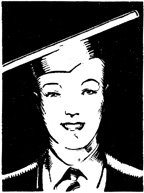 “It is the light of course but it is necessary that the place be clean and pleasant.”
“It is the light of course but it is necessary that the place be clean and pleasant.”--Ernest Hemingway
This week found Rebel Girl making an unlikely tour of campuses: Wednesday found her down at San Diego State, speaking to a bevy of MFAs on the unlikely topic, “Life After the MFA”–-and, especially, life in community colleges--and Friday found her across town at the University Club at UCI, attending an English Faculty Forum where she was pleased to see the high standards and fine teaching at IVC’s department of English generally recognized, and the contributions and leadership of one Kate Clark especially so.
It was an inspiring week, one of those times when one begins to wonder and dream again about what one could do, say, if one worked at a community college where the students were hungry for enrichment: establish a reading series, produce a film series, create a monthly drop-in literary seminar hosted by faculty, design a weekend retreat for creative writers-–one dreams until one returns to reality across town and recognizes the reality of teaching a full load and at the same time managing an academic department (scheduling classes, hiring adjunct, evaluating adjunct (18 evals due by December!), meeting disgruntled students, etc. etc.). Poof! “One,” to quote Three Dog Night, “is the loneliest number that you’ll ever do.”
 But it was at San Diego State where Rebel Girl experienced the singular moment of her instructive, if lonely, week. There she was, holding forth in a modest but well-appointed and hygienic room, encircled by graduate students. Previously she had feasted on a wonderful lunch at the Prado at Balboa Park (Black bean soup! Grilled veggie quesadillas! Art on the walls! Lively conversation! Iced tea!) and it had left her feeling not only well-fed, but, gosh darn it all, appreciated.
But it was at San Diego State where Rebel Girl experienced the singular moment of her instructive, if lonely, week. There she was, holding forth in a modest but well-appointed and hygienic room, encircled by graduate students. Previously she had feasted on a wonderful lunch at the Prado at Balboa Park (Black bean soup! Grilled veggie quesadillas! Art on the walls! Lively conversation! Iced tea!) and it had left her feeling not only well-fed, but, gosh darn it all, appreciated.Anyway, there she was and there they were, 20 some students and their professors. It was going well. I could tell. They asked questions, made notes, smiled at the right moments, laughed at my jokes, looked concerned or alarmed when the rhetorical strategy suggested they should.
 Then, at the window, appeared a figure with a squeegee. I watched as the man moved the squeegee across the classroom window. In a few strokes, the window, which hadn’t seemed too dirty to begin with, was even cleaner, sparkling, the bright San Diego sunshine pouring in, brighter than before. And then the man with the squeegee moved on. No one else seemed to notice him. I had the impression that they had seen him-–or someone like him-–before. The man, the squeegee, the window--this wasn’t an unusual occurrence. The man with the squeegee seemed to know what he was doing, as if he had a plan, as if he perhaps did this all the time and had other windows to visit. Perhaps, I thought, he was even paid a living wage to clean these windows in this classroom. Be still my Rebel heart-–social justice and clean windows.
Then, at the window, appeared a figure with a squeegee. I watched as the man moved the squeegee across the classroom window. In a few strokes, the window, which hadn’t seemed too dirty to begin with, was even cleaner, sparkling, the bright San Diego sunshine pouring in, brighter than before. And then the man with the squeegee moved on. No one else seemed to notice him. I had the impression that they had seen him-–or someone like him-–before. The man, the squeegee, the window--this wasn’t an unusual occurrence. The man with the squeegee seemed to know what he was doing, as if he had a plan, as if he perhaps did this all the time and had other windows to visit. Perhaps, I thought, he was even paid a living wage to clean these windows in this classroom. Be still my Rebel heart-–social justice and clean windows.I thought of my office window. It looks out to a faux brick wall. This was someone’s (the architect’s perhaps?) existential joke. In the 14 years I have worked there, I have cleaned the window twice and my officemate, I know, has cleaned it at least once: upon my arrival, he gallantly hung a window box-–but alas, the lack of sunshine and water supply, doomed our greenery. Cleaning the window requires tromping out through ivy and dragging a chair along. Suffice to say, we tolerate the gloom. A colleague in another building confesses that she does her own office windows (another similar tromp through an ivy patch) once a semester, taking along balled up newspaper to swipe away the worst of the clots of cobwebs and leaves. I don’t know what others do.
The windows in our classrooms? See for yourselves. (Pun fully intended.)
 Rebel Girl worries that she is writing too much these days about cleanliness, about broom pushing, about dust, grime. She feels as if she’s become one of those scrubbing bubbles one sees on televised commercials, a tornado of eye-watering ammonia, a Ms. Clean to Mr. Clean, he of the bald head and earring, muscleman t-shirt and matching muscles. There are other compelling issues in the world but she is stuck it seems, entranced by the man with the squeegee and what he represents, appalled by the idea of her colleague tromping out through an ivy patch with balled up newspapers and what she represents.
Rebel Girl worries that she is writing too much these days about cleanliness, about broom pushing, about dust, grime. She feels as if she’s become one of those scrubbing bubbles one sees on televised commercials, a tornado of eye-watering ammonia, a Ms. Clean to Mr. Clean, he of the bald head and earring, muscleman t-shirt and matching muscles. There are other compelling issues in the world but she is stuck it seems, entranced by the man with the squeegee and what he represents, appalled by the idea of her colleague tromping out through an ivy patch with balled up newspapers and what she represents. Rebel Girl isn’t involved in facility management at the college and she doesn’t know for sure the source of the disrepair and disregard she sees everywhere. She imagines it is something institutionally pervasive-–the lack of resources, the absence of a systemic plan, the lack of people power to really do the job-–and perhaps, that plague of despair that the Accreditation Team noted. All she knows is that if her mother ran the place (her mother, mother to five daughters), well, none of this would be tolerated; each daughter would be responsible for a single building or quadrant, given a bucket, a mop and toothbrush and other suitable tools and that would be that. My childhood Saturdays smelled of bleach. We lived in the projects but, damn it, we were clean. Of course, if my mother ran the place the cafeteria would serve liquor beginning at noon, but that’s another story.
Rebel Girl does know that she isn’t the only one who desires a clean, well-lighted place, who thinks that perhaps such standards are not extraordinary but instead fundamental for classrooms.
Late last week, before Rebel Girl was visited by the angel with the squeegee, she was talking dirt with another esteemed colleague.
He confided to her that in the late 70s, he worked at The Wherehouse, a chain of what we then quaintly called record stores. Rebel Girl knew what the chain was, even though she was more of a Licorice Pizza gal.
You know what those stores were like, he said, alluding no doubt to the posters and progressive music, the bad t-shirts and incense. But, he added, with emphasis, they were also clean. They cleaned every night, he said, so that when the stores opened in the morning, the workers and the customers were greeted by shining floors and clean counters. It was a given. Every now and again, he said, smiling, not every night but often enough, they’d get out these big floor buffers and buff the floor. "Now, at this place," he said, "twenty minutes after arriving in my office, my eyes water, my nose runs."
The bike racks at the college, he pointed out, have been primed and painted a cheery blue. He doesn’t begrudge the bike racks their paint and primer, he was quick to say, but he did wonder where, in the scheme of urgent tasks, the bike racks came up, before, say, other issues.
What did Rebel Girl tell those MFAs about life in the community college? I praised my students. I bragged about their accomplishments. I commended my colleagues. I acknowledged the attacks on higher education that make the future bleak-–but that make our mission even more necessary. I told them that I never once regretted my decision to teach. It’s all true.
I didn’t mention squeegees and windows and the students who repair furniture for their instructors and bring batteries for the classroom clocks and the mice in the ceiling and the rats’ nests in the portables and the political conditions which find our chancellor obscenely overpaid while the true workers who keep this place going fight for a fair contract. I didn’t mention the sign that, back when he was president, the chancellor famously hung in his meeting room: How do our decisions affect students?
Perhaps the chancellor believes that his salary, the physical conditions of his life and workplace, the resources available to him, his fancy new car, his Big Chair, his fancy new office digs-–perhaps he imagines that he is a symbol of the district’s success, that our students and indeed ourselves can look at him and feel pride. As goes Raghu, so go us all. But he isn’t a symbol of success, of course. He is, if anything, a symbol of wretched excess, squandered resources, the rise of mediocrity and the power of nepotism.
Meanwhile, the lights flicker in my classroom. The mice scurry across the ceiling. The air conditioning fails to work, so we prop open the door with a tin trash can. Soon the room fills with autumn leaves. We laugh and make the most of it. We work hard at transcending our surroundings, very hard. My students know-–they are smart, after
 all-–that the conditions of their classrooms reveal what the college thinks of them.
all-–that the conditions of their classrooms reveal what the college thinks of them. To their credit, they think more of themselves than that.
-Rebel Girl














